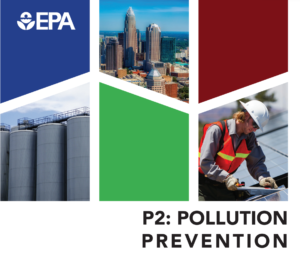Greening Industries in North Carolina: Pollution Prevention Partnership with ECU
The U.S. Environmental Protection Agency (EPA) provides grants for pollution prevention activities so that businesses may reduce their environmental footprint and simultaneously save money. East Carolina University (ECU), who has continuously received funding from this program since 2014, reached out to the N.C. Clean Energy Technology Center (NCCETC) to partner for the 2020-2022 grant period. This project entitled “Greening Industries in North Carolina: Making Pollution Prevention Pay” will continue to provide pollution prevention technical assistance to North Carolina’s industrial companies.

The success of the program is evident based on recent reductions. In 2017, the pollution prevention activity implemented by participating companies across North Carolina prevented the generation of 351,000 tons of hazardous and landfilled waste combined.
Tarek Abdel-Salam, P.h.D, and Associate Dean for Research and Director of the Center for Sustainability at ECU, is the principal investigator for the overall pollution prevention work.
“The main aim of this EPA pollution prevention project is to help the industries of North Carolina to reduce their energy and water consumption and to improve their energy systems,” said Abdel-Salam. “By leveraging the expertise of the N.C. Clean Energy Technology Center, this project, which is one of the collaborative efforts between the two centers, will better serve the North Carolina industries and the community at large. This project will last for three years and is the beginning of many more future collaborations between the two centers.”
Project Details
The NCCETC will work with eight different companies with sites predominantly east of I-95. The work consists of on-site energy assessments which includes the identification of energy efficiency improvements, capital costs, simple payback and the reduction of CO2 per year.
Examples of suggested changes may include efficiencies in HVAC, lighting, or a shift to equipment usage during off-peak timeframes, etc. Undoubtedly, Covid-19 will impact project site selection but the team is optimistic that manufacturing companies will benefit from the no-cost technical assistance.
Ted Spencer, Clean Power & Industrial Efficiency Project Engineer, will oversee the project for the NCCETC.
“We’re excited about this partnership as manufacturers continue to seek opportunities to reduce their impact on the environment and the reduction in operational costs helps them remain competitive,” said Spencer.
In the end, companies that adopt these recommendations have a better environmental outcome because they reduce pollution prior to recycling, treatment or disposal. While there is a capital investment required for any energy upfit, companies save money over time with reduced environmental and energy costs. The hope is that the work will contribute to either a course of study for energy managers to evaluate opportunities within their businesses for pollution prevention or another tool that they can use going forward – both of which lead to cost savings. The NCCETC looks forward to its partnership with ECU in this work and will provide profiles of participants in the near future.
For more information, contact Kimberly Conley with NCCETC.
*Based on recommendations being implemented by the individual facility.